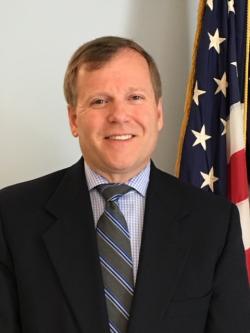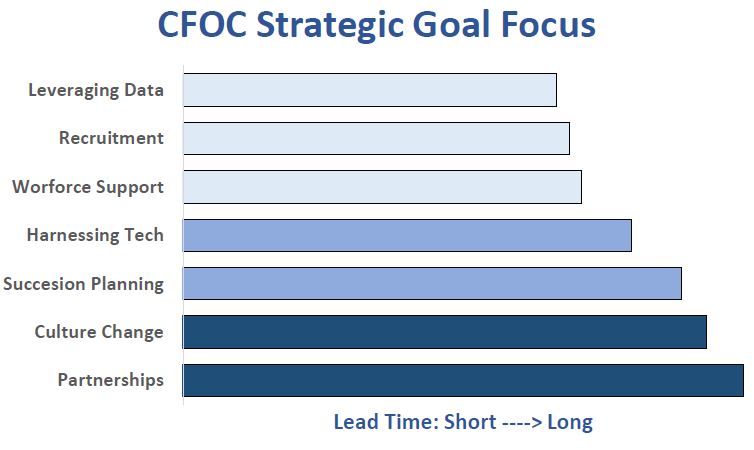CFO Council plans to close workforce gaps in the short, long terms
The CFO Council’s recent strategy made succession planning one of seven strategic goals to prepare agency financial management offices for the impending future.
Best listening experience is on Chrome, Firefox or Safari. Subscribe to Federal Drive’s daily audio interviews on Apple Podcasts or PodcastOne.
The fewest number of federal employees retired in 2020 than at any time in the last 10 years. But with more than 30% of all federal employees eligible to retire in 2022, succession planning efforts are particularly important for agency functions like financial management, which expects to be hit hard by long-time employees heading into the sunset.
The CFO Council’s recent workforce strategy made succession planning one of seven strategic goals to prepare agency financial management offices for the impending future.
Steve Kunze, the deputy CFO at the Commerce Department and one of the co-authors of the strategy, said one of the council’s goals is to use technology to understand the skill gaps of today and the potential ones in the future.

Across the government today, understanding where the skill gaps exist is difficult because knowledge management systems are siloed, resulting in disparate approaches to training the next generation of financial management workers.
“Knowledge can be stored in a variety of ways, but it is of little value if it cannot be accessed by the people critical to accomplishing the mission,” the council’s workforce strategy stated. “Designing and implementing across-agency program that mentors and trains employees and innovates new ways to apply and utilize the knowledge will be critical to effectively building the workforce of the future.”
The council said it’s important for the current and future employees to experience cross-training in other disciplines such as technology, go on details to other agencies or even industry and have interagency development programs.
“Our hope is that we will be able to identify or leverage existing technologies that would allow us to create an infrastructure to identify what where our needs are, whether or not we have gaps, and to help individual agencies work towards filling those gaps as far as a knowledge base and an experiential base,” Kunze said in an interview with Federal News Network. “We’re hopeful that the next steps of this would be each of these strategic goals will end up having a working group assigned to them, that will create an actual plan of action to help us come to fruition in each of these goals. We’re still in those preliminary stages.”
The council said it wants to help agencies develop clear succession plans and ways to capture veteran employees’ knowledge so future generations of workers can benefit from their experiences.
Additionally, the council said it wants to create a universal mentoring and training system that lets employees take advantage of learning firsthand from those experienced employees.
Mike Wetklow, deputy CFO at the National Science Foundation and another one of the co-authors of the strategy, said a key piece to this succession planning effort is communicating with college and high school students what the future of federal financial management looks like.
“The CFO Council just put out a brochure to help students understand what financial management is, and understand the types of careers that they could have coming to work for the federal government,” he said. “The one thing I tend to think about with succession planning is just understanding that so much is going to change between now and the future. We were brought up on with operations and compliance, and financial systems. We’re finding today that we have a renewed emphasis for shared services and to do less of the operational work and the grinding work, and do more decision support. There’s a shift that we’re trying to prepare the folks that will succeed us over time.”

One of the ways the council can address both succession planning and improving training is through its learning portal. The council is building an integrated education portal to provide career path, training resources and reskilling options for the 140,000 members of the financial management workforce based on the standards competency model developed with the Office of Personnel Management.
Ben Ficks, deputy CFO at the Nuclear Regulatory Commission and also one of the co-authors of the strategy, said the vision for the portal is to support the workforce in receiving innovative external training in specific skill areas.
“We’ve accomplished some things already last year. We did some market research, [the General Services Administration] facilitated that process to better understand the marketplace and better define our needs. We also identified 10 priority skill needs for the federal financial workforce, so there’s a clear picture of what we’re looking for in terms of expectations going forward the rest of the year and beyond,” Ficks said. “We look forward to working with GSA to establish a version 1.0 of our learning portal, where we plan to provide vendor training to be identified and aligned with our standard financial competency model that OPM helped us develop a couple years ago, that basically employees can come in and self assess their training needs against that model. Then they could access the training that they want to take with vetted providers that can best meet their needs with new skill sets and other skill sets that they need, like data management.”
He said the CFO Council is working with GSA on a procurement strategy and a request for information may be out to industry later this year for the learning portal.
Common vacancy announcement pilot
Kunze added that by having a learning portal, financial management workers will have a more streamlined process to find and take training.
He said the future versions may even include a mentoring component to let senior executives share their experiences and knowledge more broadly.
“That way, we hit both the competencies, the skill sets, getting the training, as well as developing future leaders and providing experiential opportunities for the entire workforce,” Kunze said. “That’s a version four or five down the road. It’s not going to happen overnight. But it is something that we’re hoping that we could actually build in as we continue down this path.”
Wetklow said another pilot program that the council is ready to expand is the use of common vacancy announcements across the government.
The departments of Defense and Homeland Security joined Commerce, NSF and others to test this approach out last year.
Wetklow said having common vacancy announcements made it easier to recruit and hire employees, while also reducing the time to hire.
Copyright © 2025 Federal News Network. All rights reserved. This website is not intended for users located within the European Economic Area.
Jason Miller is executive editor of Federal News Network and directs news coverage on the people, policy and programs of the federal government.
Follow @jmillerWFED






